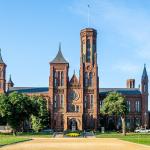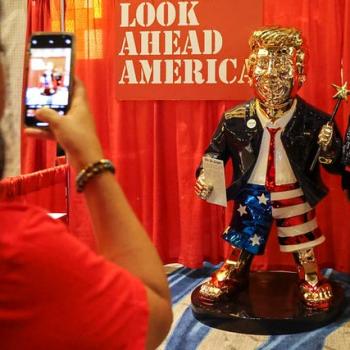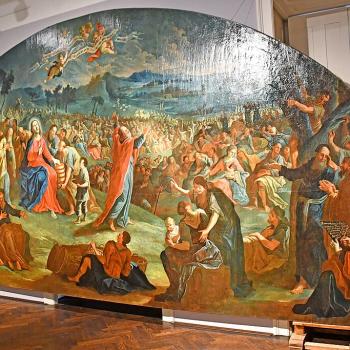
Paul presents to us an interesting picture of many of Christ’s apostles, one which included himself (because, despiite the unusual circumstance of his calling, he had been accepted as an apostle). They sold everything they owned. They gave up everything that got in their way of following Jesus. They received abuse after abuse. They were scattered around the known world. Many of them became homeless, living with and journeying with the outcasts of society. They lifted up the least among the people of the world, working with them, enduring their hardships with them. They, like Christ, sought to bring blessings to everyone, even to their tormentors, while lifting up those who unjustly suffered at the hands of the powers that be as a way of promoting justice (as can be seen in the way Paul was welcomed by the apostles before becoming one of them after his conversion to the Christian faith):
To the present hour we hunger and thirst, we are ill-clad and buffeted and homeless, and we labor, working with our own hands. When reviled, we bless; when persecuted, we endure; when slandered, we try to conciliate; we have become, and are now, as the refuse of the world, the offscouring of all things (1 Cor. 4:11-13 RSV).
We should look to the apostles as examples, revealing to us how should live our faith. They not only established many of the basic principles of Christian doctrine and praxis, they did so by living out what they taught, showing us that the two must go together. They learned what really matters. It is not wealth. It is not power. It is not earthly glory. It is love and the way of love, the love which not only connects us with the rest of humanity, but with God.
The Christian faith often has been used for various ill-begotten pursuits; those who do so abuse the faith, and should not be seen as exemplars for us to imitate. The Christian faith is more than the news that we can be saved; it tells us we must work out our salvation, putting its teachings into action. We might not be called, like the apostles, to engage an extreme form of discipleship, but we should see how the faith can be lived out, indeed, that it is meant to reflect what we pray when we pray the Lord’s prayer, which is to make God’s will manifested on earth as it is in heaven. Paul, therefore, told us we should not be ashamed if we do not have the same charism as he did, but he did so by encouraging us to find ways to imitate him just as he imitated Christ:
I do not write this to make you ashamed, but to admonish you as my beloved children. For though you have countless guides in Christ, you do not have many fathers. For I became your father in Christ Jesus through the gospel. I urge you, then, be imitators of me (1 Cor. 4:14-16 RSV).
Everyone one of us has our own unique charism, something which is connected to who and what we are as a person in Christ. It energizes us, gives us grace, and so the means to develop ourselves, so that, once we realize our true personal identity, we are free to act in accordance to it, and the more we do so, the more we will find ourselves becoming better and better. Thus, our charism not only helps us identify who we are, but it also helps set us free, so we can have a share in our own personal self-development. God has made room for us to develop who we will be in eternity, which is why our temporal existence is important. We are to live out our faith, helping those we can; if we do so, we will be able to find the mote in our eye, the mountain of sin which gets in our way of God, and cast it aside; we will live by faith, a faith which is proven by the way we love. For, as love can overcome a multitude of sins, so our faith manifested in love is able to say to the mountain of sin, “move from here,” and it will. We will be able to cast out the power of evil which seeks to dominate us:
Then the disciples came to Jesus privately and said, “Why could we not cast it out?” He said to them, “Because of your little faith. For truly, I say to you, if you have faith as a grain of mustard seed, you will say to this mountain, `Move from here to there,’ and it will move; and nothing will be impossible to you.” (Matt. 17:19-20 RSV).
Faith, as James pointed out, is more than just mere belief; it is fidelity, a fidelity to the way of love; it is strengthened and made true if we follow the path of love. If we see people in need, we will treat them with love, helping them if we can; if we don’t, if we ignore them, if we are treat them with contempt, our faith will slowly rot from the inside until it can be said to have died, that is, to no longer be said to be a living faith:
What does it profit, my brethren, if a man says he has faith but has not works? Can his faith save him? If a brother or sister is ill-clad and in lack of daily food, and one of you says to them, “Go in peace, be warmed and filled,” without giving them the things needed for the body, what does it profit? So faith by itself, if it has no works, is dead (Jas. 2:14-17 RSV).
We do not need to let evil powers, demonic influences, control us, but so long as we do not have the faith which moves mountains, the faith which is manifest in works of love, the faith which is real and solid, those powers will surround us and cause us much pain and confusion, causing us to stray from the fullness of the faith. We must resist such evil and strengthen our resolve to love, and in doing so, strengthen our faith; if we do so, we will find our mountain of sin can be cast aside. We will truly be living out the examples of faith presented to us by Paul and the other apostles. Sadly, if we do not have a faith solidified by love, we will find the mountain of sin, and the demonic powers which surround such evil, haunting us, trying to control and manipulate us; we will find it will not be so easily removed, indeed, it will stand in our way, not only hindering our spiritual development, but threatening to hold us down by its spiritual weight. This is why it is important for us to realize that faith is more than a concern for right doctrine, but right action, so that it can become a faith that moves mountains, a faith geared towards love and the praxis which flows from such love.
Stay in touch! Like A Little Bit of Nothing on Facebook.
If you liked what you read, please consider sharing it with your friends and family!
N.B.: While I read comments to moderate them, I rarely respond to them. If I don’t respond to your comment directly, don’t assume I am unthankful for it. I appreciate it. But I want readers to feel free to ask questions, and hopefully, dialogue with each other. I have shared what I wanted to say, though some responses will get a brief reply by me, or, if I find it interesting and something I can engage fully, as the foundation for another post. I have had many posts inspired or improved upon thanks to my readers.











